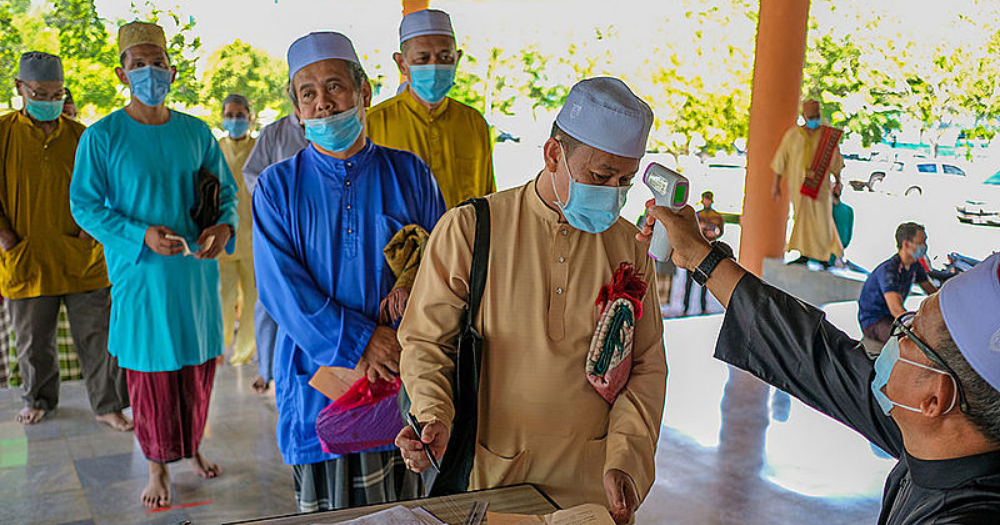Follow us on Telegram for the latest updates: https://t.me/mothershipsg
In light of health data showing "significant disparities" between the health behaviours and outcomes of different ethnic groups in Singapore, the Ministry of Health (MOH) established a workgroup in Feb. 2021 to improve the health of ethnic minority groups.
In MOH's Committee of Supply Debates on Friday (Mar. 5), Parliamentary Secretary for Health Rahayu Mahzam shared more about the ministry's efforts in working with minority groups.
"Cultural differences" impacting health behaviours
In its press release, MOH said that certain data suggests that "there may be cultural differences influencing lifestyles and health behaviours".
Some examples that the ministry gave during a media briefing include:
- Malays and Indians have a higher prevalence of diabetes.
- Malays and Chinese have a higher prevalence of high blood pressure.
- While the Chinese have consistently had the highest age-standardised cancer incidence, the proportion of Malays among all cases of cancer has gradually increased over the decades.
Rahayu also spoke about the research on health differences between ethnic groups:
"Looking upstream at other modifiable lifestyle risk factors, the Malays have the highest obesity rates, and Indians have the highest prevalence of being overweight.
The prevalence of daily smokers is more than twice as high amongst the Malays as compared to the Chinese and Indians."
MOH said that the new workgroup will first focus its efforts on the Malay community before expanding to other ethnic minority groups.
It will be led by Rahayu and Members of Parliament (MPs) Wan Rizal and Mariam Jaafar, to design culturally-relevant programmes for the Malay community, to help rally the community against "poor health habits".
Working with community organisations
"Cultural preferences may influence health behaviours and we recognise the importance of engagement and collaboration with the different ethnic minority groups to design culturally relevant programmes," Rahayu said.
This will be done by co-creating and implementing year-round healthy living activities in the Malay community, with the overall aim of improving health and well-being, said MOH in the briefing.
The workgroup will be supported by the Health Promotion Board (HPB), People's Association Malay Activity Executive Committees Council (MESRA), Muis, Mendaki, and the Muslim Healthcare Professionals Association (MHPA).
Other community partners, such as voluntary welfare organisations, may subsequently join the workgroup and extend its efforts and reach, MOH said.
After the workgroup focuses on the Malay population, it will then move on to other ethnic minority groups.
The workgroup will subsequently work with Indian organisations, such as Singapore Indian Development Association (SINDA), the Hindu Endowments Board, and NARPANI Pearavai.
Responding to a media question, MOH said that it will not focus on the Chinese ethnic group, since they are the majority in Singapore, and thus national initiatives will cater for them.
The ministry recognised that there are certain conditions that Chinese people are predisposed to, and said that it ensures that its initiatives cater for them as well.
Past backlash over ethnicity-based health differences
This idea of ethnicity-based health differences has been something that has been discussed for years, including by Prime Minister Lee Hsien Loong, who called diabetes a "health crisis" for Malays and Indians in his 2017 National Day Rally speech.
And it has not been without its fair share of backlash.
Responding to a question from media during the press briefing about the decision of which ethnic minority group to start with, MOH said that its objective is not to single out any one group, but rather to encourage "health for all".
The ministry said that while Singapore has taken a "national" approach toward looking at health issues in the past, there are certain limitations to doing so.
Thus, the ministry said that over the years — especially since 2017 — it has focused specifically on ethnic minorities, and the Malay community in particular, recognising that there are cultural differences.
Made a lot of progress by focusing on Malay population: MOH
To only focus on making sure that food that the majority of the population eats ignores the availability of healthy halal alternatives for the Malay population, said MOH in the media briefing.
The ministry said that while it was "very hard" to persuade businesses selling halal food to switch to healthier alternatives, it has made "tremendous progress" in the past two or three years.
In the past year, despite the ongoing Covid-19 pandemic, the number of outlets selling healthier halal food increased from 1,007 to 2,007.
In addition, MOH said that there are "very specific social settings" — for the Malay community in particular — which serve as important avenues for the community to receive information about health measures, such as mosques.
MOH said through the Jaga Kesihatan, Jaga Ummah (take care of health, take care of community) programme, it worked with 32 mosques last year to share messages about healthy eating and smoking programmes.
Measures of success
How will MOH know if the workgroup is effective?
In its media briefing, the ministry said that it will look at both short-term measures and long-term measures.
The short-term measures include the number of people who take part in the programme and the effectiveness of the programme, such as by looking at improvements in people's diets, the amount of exercise they partake in, and the rate of quitting smoking.
For looking at long-term effectiveness, MOH said that it will refer to national surveys which examine health behaviours of Singaporeans, looking into more detail at the trends over time of specific subgroups of people.
Totally unrelated but follow and listen to our podcast here
Top photo via muslim.sg.
If you like what you read, follow us on Facebook, Instagram, Twitter and Telegram to get the latest updates.
